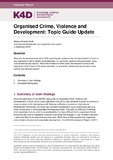| dc.contributor.author | Schultze-Kraft, Markus | |
| dc.coverage.spatial | Colombia | en |
| dc.coverage.spatial | Afghanistan | en |
| dc.coverage.spatial | Democratic Republic of Congo | en |
| dc.coverage.spatial | DRC | en |
| dc.coverage.spatial | Somalia | en |
| dc.coverage.spatial | Mexico | en |
| dc.coverage.spatial | Nigeria | en |
| dc.coverage.spatial | Ghana | en |
| dc.coverage.spatial | Morocco | en |
| dc.coverage.spatial | Uganda | en |
| dc.coverage.spatial | Mozambique | en |
| dc.coverage.spatial | Thailand | en |
| dc.coverage.spatial | Azerbaijan | en |
| dc.coverage.spatial | Turkey | en |
| dc.coverage.spatial | European Union | en |
| dc.coverage.spatial | Egypt | en |
| dc.coverage.spatial | Kenya | en |
| dc.date.accessioned | 2018-12-17T15:42:57Z | |
| dc.date.available | 2018-12-17T15:42:57Z | |
| dc.date.issued | 2018-09-03 | |
| dc.identifier.citation | Schultze-Kraft, M. (2018). Organised Crime, Violence and Development: Topic Guide Update. K4D Helpdesk Report. Brighton, UK: Institute of Development Studies | en |
| dc.identifier.uri | https://opendocs.ids.ac.uk/opendocs/handle/20.500.12413/14186 | |
| dc.description.abstract | Since the publication of the GSDRC topic guide on Organised Crime, Violence and Development in 2016, serious and organised crime (SOC) has remained a cause for concern in many countries in the developing world. Marking a difference to previous international development frameworks, the issue has now been included both as an explicit goal and as a cross-cutting issue in the Sustainable Development Goals. This report identifies some of the latest key literature on organised crime and its manifestations, workings and impacts in development settings. The majority of the literature examined for this report focuses on economic, political and governance issues. Socio-cultural and human security aspects of organised crime and any effects they may have on development processes are not at the forefront in this literature.
In summary, the review found that there is a growing emphasis in the literature on the insertion of organised crime in developing countries, particularly in Africa, into the global criminal economy. Organised criminal activities are part of broader (decentralised) governance structures and political orders. In many countries, such activities underpin governance arrangements and political institutions and settlements, rather than merely filling gaps left by state incapacity, underperformance or absence. In developing countries where organised criminal structures and activities are pervasive, including large-scale political and public sector corruption, industrial-scale oil theft and even drug trafficking, such activities are not necessarily perceived as ‘immoral’ or depraved, but can boast significant social legitimacy. In the past fifteen years or so, the relationship between security and development has become increasingly well recognised. Although Organisation for Economic Co-Operation and Development (OECD) Development Assistance Committee (DAC) considers organised crime as a ‘hard’ security issue and places it outside of the mandate of development actors, SDGs, particularly Target 16.4, unequivocally place organised crime on the development agenda. One of the challenges highlighted in the latest literature is that criminals, who traditionally have been seen as a threat to the security and stability of (developing) states and society, are today finding themselves in the role of providing essential public services in many development settings. This type of informal illegal-criminal provision of public services, however, often comes at the cost of urban gang violence, including turf wars between rival gangs and other criminal organisations, and jeopardises the state’s monopoly on the legitimate use of violence and coercion. | en |
| dc.language.iso | en | en |
| dc.publisher | IDS | en |
| dc.relation.ispartofseries | K4D Helpdesk Report;432 | |
| dc.rights.uri | https://www.nationalarchives.gov.uk/doc/open-government-licence/version/3/ | en |
| dc.subject | Aid | en |
| dc.subject | Health | en |
| dc.subject | Politics and Power | en |
| dc.subject | Security and Conflict | en |
| dc.subject | Social Protection | en |
| dc.subject | Trade | en |
| dc.title | Organised Crime, Violence and Development: Topic Guide Update | en |
| dc.type | Other | en |
| dc.rights.holder | © DFID - Crown copyright 2018. | en |
| dcterms.dateAccepted | 2018-09-03 | |
| rioxxterms.funder | Department for International Development, UK Government | en |
| rioxxterms.identifier.project | K4D | en |
| rioxxterms.version | VoR | en |
| rioxxterms.funder.project | 238a9fa4-fe4a-4380-996b-995f33607ba0 | en |

